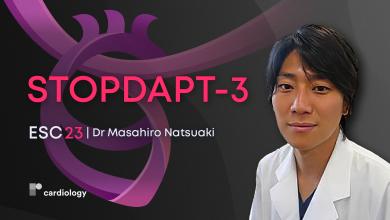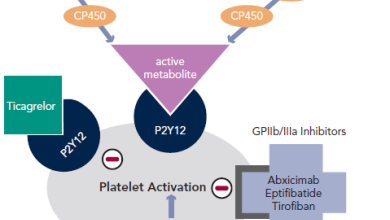Search results
Author(s):
Masahiro Natsuaki
Added:
7 months ago
ESC 23 — Dr Masahiro Natsuaki (Saga University, JP) discusses the short and optimal duration of dual antiplatelet therapy-3 Study (STOPDAPT-3) (NCT04609111).
In the STOPDAPT-2 study, 1-month dual antiplatelet therapy (DAPT) followed by clopidogrel monotherapy was shown to provide benefits in bleeding reduction over a 12-month period, however, other trials have shown high rates of bleeding at…
View more
Author(s):
Timm Bauer
,
Christian Hamm
Added:
3 years ago
Introduction
Antiplatelet therapy is a cornerstone in coronary artery disease (CAD) management. Acetylsalicyclic acid (ASA) has been known for many decades to have antithrombotic efficacy. Already in the 1980’s, the ISIS-2 study demonstrated that ASA reduces mortality in acute myocardial infarction (AMI) by 23 %.1 ASA leads to irreversible inactivation of cyclooxygenase 1 and thereby blocks the…
View more
Author(s):
Natalia Dovlatova
,
Stan Heptinstall
Added:
3 years ago
Currently, attention is focused on the therapeutic use of P2Y12 receptor antagonists in patients with cardiovascular pathologies, especially during and following coronary interventions. Such drugs inhibit platelet aggregation brought about by adenosine diphosphate (ADP), which plays a central role in platelet function.1 ADP activates platelets via two specific receptors on the platelet surface,…
View more
Author(s):
Sri Raveen Kandan
,
Thomas W Johnson
Added:
3 years ago
Antiplatelet Therapy
Current guidelines support the early administration of oral antiplatelet agents upstream of angiographic assessment and intervention.1 Aspirin is commonly given by the first medical contact and additional oral antiplatelet drugs are administered on arrival in hospital (see Figure 1).
Aspirin
The efficacy of aspirin in acute ST-segment elevation myocardial infarction (STEMI)…
View more
Author(s):
Benjamin Galper
,
Roxana Mehran
Added:
3 years ago
Acute coronary syndromes (ACS) result from unstable coronary artery plaques that rupture and can lead to coronary ischaemia, unstable angina and myocardial infarction. The treatment goals in ACS focus on reducing ischaemia, preventing further progression of thrombotic plaque by disturbing the milieu of thrombosis and platelet aggregation taking place within the coronary artery and, in the case of…
View more
Author(s):
Darshni Arishta Jhagroe
,
Jur ten Berg
Added:
3 years ago
Dual antiplatelet therapy (DAPT) is indicated in patients who need to undergo percutaneous coronary intervention (PCI) procedures.1 Compared with oral anticoagulation (OAC) and aspirin, DAPT has been shown to reduce the risk of thrombotic events and the rate of bleeding events.2 Chronic OAC is required in up to 10 % of the patients undergoing PCI, and is usually indicated for AF and mechanical…
View more
Author(s):
Jean-Philippe Collet
Added:
3 years ago
The role of platelets in coronary artery thrombosis is well-established.1 They also play a critical role in a number of cardiovascular conditions including stroke, peripheral vascular disease and diabetes, and may be involved in the pathology underlying atherosclerotic changes.1 Antiplatelet agents such as clopidogrel, a platelet P2Y12 receptor antagonist, and aspirin are used for the prevention…
View more
Author(s):
Gabriele Pesarini
,
Sara Ariotti
,
Flavio Ribichini
Added:
3 years ago
Haemostasis is a complex phenomenon defined as the chain of mechanisms able to maintain the integrity of a closed, high-pressure circulatory system after vascular damage.1 Thrombogenesis represents the main process assuring haemostasis at each level of the vascular system, and its accurate regulation guarantees the correct balance between blood flow and damage repair. An uncontrolled thrombin…
View more
Optimum Therapies for ST-Elevation Myocardial Infarction Managed with Primary Percutaneous Coronary…
Author(s):
Bruce R Brodie
Added:
3 years ago
Article
Author(s):
Stuart J Head
,
Ad JJC Bogers
,
A Pieter Kappetein
Added:
3 years ago
Valvular Heart Surgery
The field of cardiac surgery is urgently in need of new anticoagulant agents. Approximately 300,000 prosthetic valves are implanted yearly, after which lifelong anticoagulation therapy is mandatory as thromboprophylaxis. To date, vitamin K antagonists (VKAs), such as warfarin, remain the only licensed agents to prevent mechanical valve-induced thromboembolic events but…
View more












